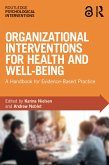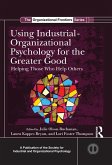Organizational Change (eBook, PDF)
Psychological effects and strategies for coping
Redaktion: Vakola, Maria; Petrou, Paraskevas
43,95 €
43,95 €
inkl. MwSt.
Sofort per Download lieferbar

22 °P sammeln
43,95 €
Als Download kaufen

43,95 €
inkl. MwSt.
Sofort per Download lieferbar

22 °P sammeln
Jetzt verschenken
Alle Infos zum eBook verschenken
43,95 €
inkl. MwSt.
Sofort per Download lieferbar
Alle Infos zum eBook verschenken

22 °P sammeln
Organizational Change (eBook, PDF)
Psychological effects and strategies for coping
Redaktion: Vakola, Maria; Petrou, Paraskevas
- Format: PDF
- Merkliste
- Auf die Merkliste
- Bewerten Bewerten
- Teilen
- Produkt teilen
- Produkterinnerung
- Produkterinnerung

Bitte loggen Sie sich zunächst in Ihr Kundenkonto ein oder registrieren Sie sich bei
bücher.de, um das eBook-Abo tolino select nutzen zu können.
Hier können Sie sich einloggen
Hier können Sie sich einloggen
Sie sind bereits eingeloggt. Klicken Sie auf 2. tolino select Abo, um fortzufahren.

Bitte loggen Sie sich zunächst in Ihr Kundenkonto ein oder registrieren Sie sich bei bücher.de, um das eBook-Abo tolino select nutzen zu können.
Organizational change is a reality of working life, but what psychological effects does it have on individual workers, and what coping strategies can be used to mediate its impact? In this important new book, an international range of scholars examine the key psychological issues around organizational change,
- Geräte: PC
- ohne Kopierschutz
- eBook Hilfe
- Größe: 1.48MB
Andere Kunden interessierten sich auch für
![Becoming an Industrial-Organizational Psychologist (eBook, PDF) Becoming an Industrial-Organizational Psychologist (eBook, PDF)]() Dennis DoverspikeBecoming an Industrial-Organizational Psychologist (eBook, PDF)30,95 €
Dennis DoverspikeBecoming an Industrial-Organizational Psychologist (eBook, PDF)30,95 €![Organizational Interventions for Health and Well-being (eBook, PDF) Organizational Interventions for Health and Well-being (eBook, PDF)]() Organizational Interventions for Health and Well-being (eBook, PDF)43,95 €
Organizational Interventions for Health and Well-being (eBook, PDF)43,95 €![Developing Organizational Simulations (eBook, PDF) Developing Organizational Simulations (eBook, PDF)]() George C. Thornton IIIDeveloping Organizational Simulations (eBook, PDF)43,95 €
George C. Thornton IIIDeveloping Organizational Simulations (eBook, PDF)43,95 €![Work and Organizational Psychology (eBook, PDF) Work and Organizational Psychology (eBook, PDF)]() Sebastiaan RothmannWork and Organizational Psychology (eBook, PDF)48,95 €
Sebastiaan RothmannWork and Organizational Psychology (eBook, PDF)48,95 €![Computational Modeling for Industrial-Organizational Psychologists (eBook, PDF) Computational Modeling for Industrial-Organizational Psychologists (eBook, PDF)]() Computational Modeling for Industrial-Organizational Psychologists (eBook, PDF)49,95 €
Computational Modeling for Industrial-Organizational Psychologists (eBook, PDF)49,95 €![Using Industrial-Organizational Psychology for the Greater Good (eBook, PDF) Using Industrial-Organizational Psychology for the Greater Good (eBook, PDF)]() Using Industrial-Organizational Psychology for the Greater Good (eBook, PDF)55,95 €
Using Industrial-Organizational Psychology for the Greater Good (eBook, PDF)55,95 €![Handbook of Organizational Justice (eBook, PDF) Handbook of Organizational Justice (eBook, PDF)]() Handbook of Organizational Justice (eBook, PDF)56,95 €
Handbook of Organizational Justice (eBook, PDF)56,95 €-
-
-
Organizational change is a reality of working life, but what psychological effects does it have on individual workers, and what coping strategies can be used to mediate its impact? In this important new book, an international range of scholars examine the key psychological issues around organizational change,
Dieser Download kann aus rechtlichen Gründen nur mit Rechnungsadresse in A, B, BG, CY, CZ, D, DK, EW, E, FIN, F, GR, HR, H, IRL, I, LT, L, LR, M, NL, PL, P, R, S, SLO, SK ausgeliefert werden.
Produktdetails
- Produktdetails
- Verlag: Taylor & Francis eBooks
- Seitenzahl: 192
- Erscheinungstermin: 27. April 2018
- Englisch
- ISBN-13: 9781315386096
- Artikelnr.: 56840403
- Verlag: Taylor & Francis eBooks
- Seitenzahl: 192
- Erscheinungstermin: 27. April 2018
- Englisch
- ISBN-13: 9781315386096
- Artikelnr.: 56840403
- Herstellerkennzeichnung Die Herstellerinformationen sind derzeit nicht verfügbar.
Maria Vakola, Paraskevas Petrou
1. An overview of the impact of organizational change on individuals and
organizations: An introductory note Maria Vakola (Athens University of
Economics and Business), Paraskevas Petrou, (Erasmus University Rotterdam)
Resources as change facilitators 2. Organizational Change and Employee
Functioning: Investigating Boundary Conditions Victoria Bellou, (University
of Thessaly, Greece), Despoina Xanthopoulou, (Aristotle University of
Thessaloniki, Greece), Panagiotis Gkorezis, Hellenic (Open University and
Open University of Cyprus) 3. Change consultation during organizational
restructuring: Buffering and exacerbating effects in the context of role
stress Nerina L. Jimmieson and Michelle K. Tucker (Queensland University of
Technology, Australia) 4. Individual and external coping resources as
predictors of employees' change attitudes Alannah E. Rafferty (University
of New South Wales, Australia), Nerina L. Jimmieson (Queensland University
of Technology, Australia) Emotions and Cognitions and Change Outcomes 5.
Feelings about change: The role of emotions and emotion regulation for
employee adaptation to organizational change Karen van Dam (Open
University, The Netherlands) 6. How workers' appraisals of change influence
employee outcomes Professor Karina Nielsen (Norwich Business School,
University of East Anglia, UK) 7. Dynamics of trust and fairness during
organizational change: implications for job crafting and work engagement 8.
Organizational Change: Implications for the Psychological Contract Maria
Tomprou (Carnegie Mellon, US), Samantha D. Hansen (University of Toronto,
Canada) 9. Measuring Change Recipients' Reactions: The Development and
Psychometric Evaluation of the CRRE Scale Tsaousis Ioannis and Maria Vakola
Organizational-level and team-level facilitators of change 10. Destructive
uncertainty: The toxic triangle, implicit theories and leadership identity
during organizational change Pedro Neves (Nova School of Business and
Economics, Portugal), Birgit Schyns (Durham University, UK) 11.
Organizational change and health: The specific role of job insecurity
Birgit Köper (Federal Institute of Occupational Safety and Health, Germany)
Alexandra Michel (University of Heidelberg, Germany) 12. Improving our
understanding of collective attitudes towards change formation Gavin
Schwarz (University of New South Wales, Australia), Dave Bouckenooghe
(Brock University, Canada)
organizations: An introductory note Maria Vakola (Athens University of
Economics and Business), Paraskevas Petrou, (Erasmus University Rotterdam)
Resources as change facilitators 2. Organizational Change and Employee
Functioning: Investigating Boundary Conditions Victoria Bellou, (University
of Thessaly, Greece), Despoina Xanthopoulou, (Aristotle University of
Thessaloniki, Greece), Panagiotis Gkorezis, Hellenic (Open University and
Open University of Cyprus) 3. Change consultation during organizational
restructuring: Buffering and exacerbating effects in the context of role
stress Nerina L. Jimmieson and Michelle K. Tucker (Queensland University of
Technology, Australia) 4. Individual and external coping resources as
predictors of employees' change attitudes Alannah E. Rafferty (University
of New South Wales, Australia), Nerina L. Jimmieson (Queensland University
of Technology, Australia) Emotions and Cognitions and Change Outcomes 5.
Feelings about change: The role of emotions and emotion regulation for
employee adaptation to organizational change Karen van Dam (Open
University, The Netherlands) 6. How workers' appraisals of change influence
employee outcomes Professor Karina Nielsen (Norwich Business School,
University of East Anglia, UK) 7. Dynamics of trust and fairness during
organizational change: implications for job crafting and work engagement 8.
Organizational Change: Implications for the Psychological Contract Maria
Tomprou (Carnegie Mellon, US), Samantha D. Hansen (University of Toronto,
Canada) 9. Measuring Change Recipients' Reactions: The Development and
Psychometric Evaluation of the CRRE Scale Tsaousis Ioannis and Maria Vakola
Organizational-level and team-level facilitators of change 10. Destructive
uncertainty: The toxic triangle, implicit theories and leadership identity
during organizational change Pedro Neves (Nova School of Business and
Economics, Portugal), Birgit Schyns (Durham University, UK) 11.
Organizational change and health: The specific role of job insecurity
Birgit Köper (Federal Institute of Occupational Safety and Health, Germany)
Alexandra Michel (University of Heidelberg, Germany) 12. Improving our
understanding of collective attitudes towards change formation Gavin
Schwarz (University of New South Wales, Australia), Dave Bouckenooghe
(Brock University, Canada)
1. An overview of the impact of organizational change on individuals and
organizations: An introductory note Maria Vakola (Athens University of
Economics and Business), Paraskevas Petrou, (Erasmus University Rotterdam)
Resources as change facilitators 2. Organizational Change and Employee
Functioning: Investigating Boundary Conditions Victoria Bellou, (University
of Thessaly, Greece), Despoina Xanthopoulou, (Aristotle University of
Thessaloniki, Greece), Panagiotis Gkorezis, Hellenic (Open University and
Open University of Cyprus) 3. Change consultation during organizational
restructuring: Buffering and exacerbating effects in the context of role
stress Nerina L. Jimmieson and Michelle K. Tucker (Queensland University of
Technology, Australia) 4. Individual and external coping resources as
predictors of employees' change attitudes Alannah E. Rafferty (University
of New South Wales, Australia), Nerina L. Jimmieson (Queensland University
of Technology, Australia) Emotions and Cognitions and Change Outcomes 5.
Feelings about change: The role of emotions and emotion regulation for
employee adaptation to organizational change Karen van Dam (Open
University, The Netherlands) 6. How workers' appraisals of change influence
employee outcomes Professor Karina Nielsen (Norwich Business School,
University of East Anglia, UK) 7. Dynamics of trust and fairness during
organizational change: implications for job crafting and work engagement 8.
Organizational Change: Implications for the Psychological Contract Maria
Tomprou (Carnegie Mellon, US), Samantha D. Hansen (University of Toronto,
Canada) 9. Measuring Change Recipients' Reactions: The Development and
Psychometric Evaluation of the CRRE Scale Tsaousis Ioannis and Maria Vakola
Organizational-level and team-level facilitators of change 10. Destructive
uncertainty: The toxic triangle, implicit theories and leadership identity
during organizational change Pedro Neves (Nova School of Business and
Economics, Portugal), Birgit Schyns (Durham University, UK) 11.
Organizational change and health: The specific role of job insecurity
Birgit Köper (Federal Institute of Occupational Safety and Health, Germany)
Alexandra Michel (University of Heidelberg, Germany) 12. Improving our
understanding of collective attitudes towards change formation Gavin
Schwarz (University of New South Wales, Australia), Dave Bouckenooghe
(Brock University, Canada)
organizations: An introductory note Maria Vakola (Athens University of
Economics and Business), Paraskevas Petrou, (Erasmus University Rotterdam)
Resources as change facilitators 2. Organizational Change and Employee
Functioning: Investigating Boundary Conditions Victoria Bellou, (University
of Thessaly, Greece), Despoina Xanthopoulou, (Aristotle University of
Thessaloniki, Greece), Panagiotis Gkorezis, Hellenic (Open University and
Open University of Cyprus) 3. Change consultation during organizational
restructuring: Buffering and exacerbating effects in the context of role
stress Nerina L. Jimmieson and Michelle K. Tucker (Queensland University of
Technology, Australia) 4. Individual and external coping resources as
predictors of employees' change attitudes Alannah E. Rafferty (University
of New South Wales, Australia), Nerina L. Jimmieson (Queensland University
of Technology, Australia) Emotions and Cognitions and Change Outcomes 5.
Feelings about change: The role of emotions and emotion regulation for
employee adaptation to organizational change Karen van Dam (Open
University, The Netherlands) 6. How workers' appraisals of change influence
employee outcomes Professor Karina Nielsen (Norwich Business School,
University of East Anglia, UK) 7. Dynamics of trust and fairness during
organizational change: implications for job crafting and work engagement 8.
Organizational Change: Implications for the Psychological Contract Maria
Tomprou (Carnegie Mellon, US), Samantha D. Hansen (University of Toronto,
Canada) 9. Measuring Change Recipients' Reactions: The Development and
Psychometric Evaluation of the CRRE Scale Tsaousis Ioannis and Maria Vakola
Organizational-level and team-level facilitators of change 10. Destructive
uncertainty: The toxic triangle, implicit theories and leadership identity
during organizational change Pedro Neves (Nova School of Business and
Economics, Portugal), Birgit Schyns (Durham University, UK) 11.
Organizational change and health: The specific role of job insecurity
Birgit Köper (Federal Institute of Occupational Safety and Health, Germany)
Alexandra Michel (University of Heidelberg, Germany) 12. Improving our
understanding of collective attitudes towards change formation Gavin
Schwarz (University of New South Wales, Australia), Dave Bouckenooghe
(Brock University, Canada)







